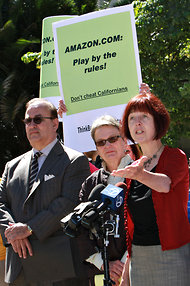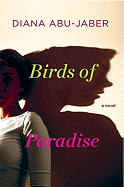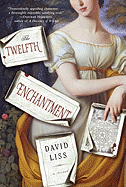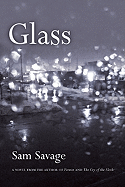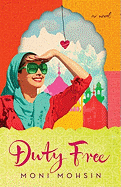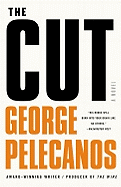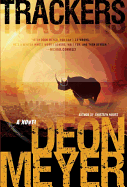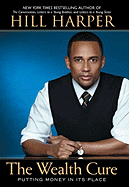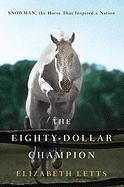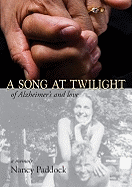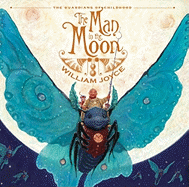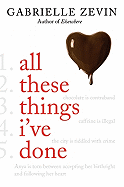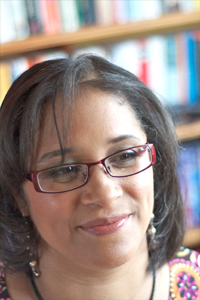 Yvvette Edwards's debut novel, A Cupboard Full of Coats (trade paper, OneWorld), made it on to the Man Booker Prize longlist. Unlike some of her peers on that list, though, Edwards hasn't spent her life in writing programs and retreats, or even working as a journalist. Instead, Edwards, who was raised by a single mother from Montserrat in the London suburb of Hackney, herself became a young single parent who needed to work full time to support her daughter. (That daughter is now pursuing a master's degree; Edwards also has two girls, nine and 10, with her husband, whom she married when her eldest was 12.)
Yvvette Edwards's debut novel, A Cupboard Full of Coats (trade paper, OneWorld), made it on to the Man Booker Prize longlist. Unlike some of her peers on that list, though, Edwards hasn't spent her life in writing programs and retreats, or even working as a journalist. Instead, Edwards, who was raised by a single mother from Montserrat in the London suburb of Hackney, herself became a young single parent who needed to work full time to support her daughter. (That daughter is now pursuing a master's degree; Edwards also has two girls, nine and 10, with her husband, whom she married when her eldest was 12.)
One of the reasons we've been discussing single parenthood is because of her novel's subject matter. The protagonist, Jinx Jackson, is trying to make sense of her mother's death at the hands of her abusive boyfriend, Berris. It's been 14 years since Berris killed Jinx's mother, and his friend Lemon shows up to tell Jinx that Berris is about to be released from prison. Should Jinx run? Will she run? Will her choices mirror her mother's, who wound up with "a cupboard full" of new coats, one given to her each time Berris hurt her?
Jinx's mother was a single parent and, as Edwards explains, both Berris and Lemon were raised by single mothers, as well. "When they were young, it's unlikely in that generation that they had two parents at home, ever. Someone in every family, it seemed, was an economic migrant. "
Edwards has gone deep into a relatively unexplored corner of life in London with her book--in fact, she was genuinely shocked when her agent pointed out that the book contains not a single white character. Yet also ultimately nonplussed: "I actually didn't think about it. I don't think my objective was to have a diverse or 'not diverse' representation of Hackney. I just had a plot in mind, and my characters happened to be from one kind of background."
However, Edwards does believe that it took some subconscious effort to get to a place where she could write a full narrative without thinking about whether or not it was diverse. "Years ago I wrote a screenplay that had two white English main characters, and I had a black character who came in to do some carpentry or whatever... that was my way of including a black character, through the back door.
"I must have gone through some sort of internalization, some kind of transition process, because by the time I turned to this book, it just wasn't an issue," she continued. "I think that my own transition tallies with the one in English society. We're all now aware that there are black people, black communities, black artists."
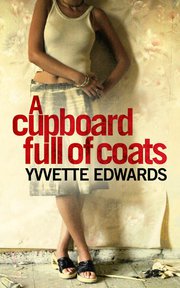 At first, Edwards recalled, "I wrote out of wanting to enjoy my own work, and to deal with issues that at the time were confusing or complex for me." Although Edwards wrote for years, it wasn't until she was about to turn 40 that she decided to become quite serious about writing something to be published. "When I got to my 39th birthday, that was the most reflective year of my life," she said. "I thought about all the things I'd ever said I wanted to do, and making a living from writing was and is my absolute dream."
At first, Edwards recalled, "I wrote out of wanting to enjoy my own work, and to deal with issues that at the time were confusing or complex for me." Although Edwards wrote for years, it wasn't until she was about to turn 40 that she decided to become quite serious about writing something to be published. "When I got to my 39th birthday, that was the most reflective year of my life," she said. "I thought about all the things I'd ever said I wanted to do, and making a living from writing was and is my absolute dream."
She decided she was not going to find another full-time job, and instead focused on writing a book. "I surprised myself by discovering that I really love doing the revisions and editing, that that's where books come together--in the refining process."
"In a way, writing or creating a piece of work is probably not that dissimilar to giving birth and trying to get that child to grow up to be a person you genuinely like not just because they're related to you, but because they are lovely on whatever terms you judge people," Edwards said. "The difference between parenting and writing a book is that you do get this opportunity to go back and refine things. It's not quite so easy with parenting!"
Fortunately for this new voice in fiction, things are working out well with her children and her book. --Bethanne Patrick
Portrait of the Artist: Yvvette Edwards



 Yvvette Edwards's debut novel, A Cupboard Full of Coats (trade paper, OneWorld), made it on to the Man Booker Prize longlist. Unlike some of her peers on that list, though, Edwards hasn't spent her life in writing programs and retreats, or even working as a journalist. Instead, Edwards, who was raised by a single mother from Montserrat in the London suburb of Hackney, herself became a young single parent who needed to work full time to support her daughter. (That daughter is now pursuing a master's degree; Edwards also has two girls, nine and 10, with her husband, whom she married when her eldest was 12.)
Yvvette Edwards's debut novel, A Cupboard Full of Coats (trade paper, OneWorld), made it on to the Man Booker Prize longlist. Unlike some of her peers on that list, though, Edwards hasn't spent her life in writing programs and retreats, or even working as a journalist. Instead, Edwards, who was raised by a single mother from Montserrat in the London suburb of Hackney, herself became a young single parent who needed to work full time to support her daughter. (That daughter is now pursuing a master's degree; Edwards also has two girls, nine and 10, with her husband, whom she married when her eldest was 12.) At first, Edwards recalled, "I wrote out of wanting to enjoy my own work, and to deal with issues that at the time were confusing or complex for me." Although Edwards wrote for years, it wasn't until she was about to turn 40 that she decided to become quite serious about writing something to be published. "When I got to my 39th birthday, that was the most reflective year of my life," she said. "I thought about all the things I'd ever said I wanted to do, and making a living from writing was and is my absolute dream."
At first, Edwards recalled, "I wrote out of wanting to enjoy my own work, and to deal with issues that at the time were confusing or complex for me." Although Edwards wrote for years, it wasn't until she was about to turn 40 that she decided to become quite serious about writing something to be published. "When I got to my 39th birthday, that was the most reflective year of my life," she said. "I thought about all the things I'd ever said I wanted to do, and making a living from writing was and is my absolute dream."
 Today is release day for Irma Voth: A Novel by Miriam Toews. Some of you will remember her delightfully quirky and poignant 2007 novel, The Flying Troutmans (Soft Skull Press), about an eternally adolescent 28-year-old's journey with her sullen teenaged nephew and precocious tweenage niece.
Today is release day for Irma Voth: A Novel by Miriam Toews. Some of you will remember her delightfully quirky and poignant 2007 novel, The Flying Troutmans (Soft Skull Press), about an eternally adolescent 28-year-old's journey with her sullen teenaged nephew and precocious tweenage niece.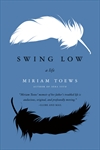 Since the scenes of Mennonite life in Toews’s new novel hearken back to her own upbringing in the more modern Mennonite world of Steinbach, Manitoba (which she described in her memoir of her father's manic depression, Swing Low: A Life), this week's book selections have to do with how other Mennonite writers have dealt with their pasts.
Since the scenes of Mennonite life in Toews’s new novel hearken back to her own upbringing in the more modern Mennonite world of Steinbach, Manitoba (which she described in her memoir of her father's manic depression, Swing Low: A Life), this week's book selections have to do with how other Mennonite writers have dealt with their pasts.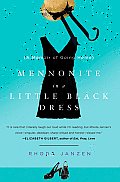 Mennonite in a Little Black Dress by Rhoda Janzen is a memoir of growing up in a modern Mennonite community in California, but chafing under the bonds of her loving and service-oriented minister father and loving and frugal-minded mother. While Janzen left home, seeking a more artistic and bohemian way, after a life-altering car accident she returned to live with her parents and bask in their love--and service and frugality. None of which description does any justice to the author's lively, learned voice.
Mennonite in a Little Black Dress by Rhoda Janzen is a memoir of growing up in a modern Mennonite community in California, but chafing under the bonds of her loving and service-oriented minister father and loving and frugal-minded mother. While Janzen left home, seeking a more artistic and bohemian way, after a life-altering car accident she returned to live with her parents and bask in their love--and service and frugality. None of which description does any justice to the author's lively, learned voice.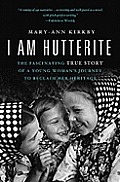 I Am Hutterite: The Fascinating True Story of a Young Woman's Journey to Reclaim Her Heritage by Mary-Ann Kirkby can be seen as the "anti-Rhoda Janzen" story in some ways. Kirkby's parents chose to reenter a "worldly" community when their daughter was 10; she and her six siblings knew nothing about packaged foods, modern music or hairstyles. Eventually, Kirkby chose to revisit her old life; she self-published her memoir to such acclaim that it found a U.S. home at Thomas Nelson.
I Am Hutterite: The Fascinating True Story of a Young Woman's Journey to Reclaim Her Heritage by Mary-Ann Kirkby can be seen as the "anti-Rhoda Janzen" story in some ways. Kirkby's parents chose to reenter a "worldly" community when their daughter was 10; she and her six siblings knew nothing about packaged foods, modern music or hairstyles. Eventually, Kirkby chose to revisit her old life; she self-published her memoir to such acclaim that it found a U.S. home at Thomas Nelson.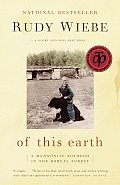 In Of This Earth: A Mennonite Boyhood in the Boreal Forest, Rudy Wiebe--one of Canada's most esteemed novelists--describes his childhood up to age 12 in the deep woods of the north, following his family's Low German (Polish and Ukrainian) Mennonite traditions. Wiebe's narrative only appears to be stream-of-consciousness; it's actually quite carefully constructed to show the strata of an almost entirely bygone way of life that nourished his creative psyche. --
In Of This Earth: A Mennonite Boyhood in the Boreal Forest, Rudy Wiebe--one of Canada's most esteemed novelists--describes his childhood up to age 12 in the deep woods of the north, following his family's Low German (Polish and Ukrainian) Mennonite traditions. Wiebe's narrative only appears to be stream-of-consciousness; it's actually quite carefully constructed to show the strata of an almost entirely bygone way of life that nourished his creative psyche. --
 Imagine spending the weekend eating, drinking, reading and schmoozing with authors like Adriana Trigiani, Matthew Norman, Joyce Maynard and Gretchen Rubin--along with some reading tastemakers, including
Imagine spending the weekend eating, drinking, reading and schmoozing with authors like Adriana Trigiani, Matthew Norman, Joyce Maynard and Gretchen Rubin--along with some reading tastemakers, including 